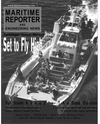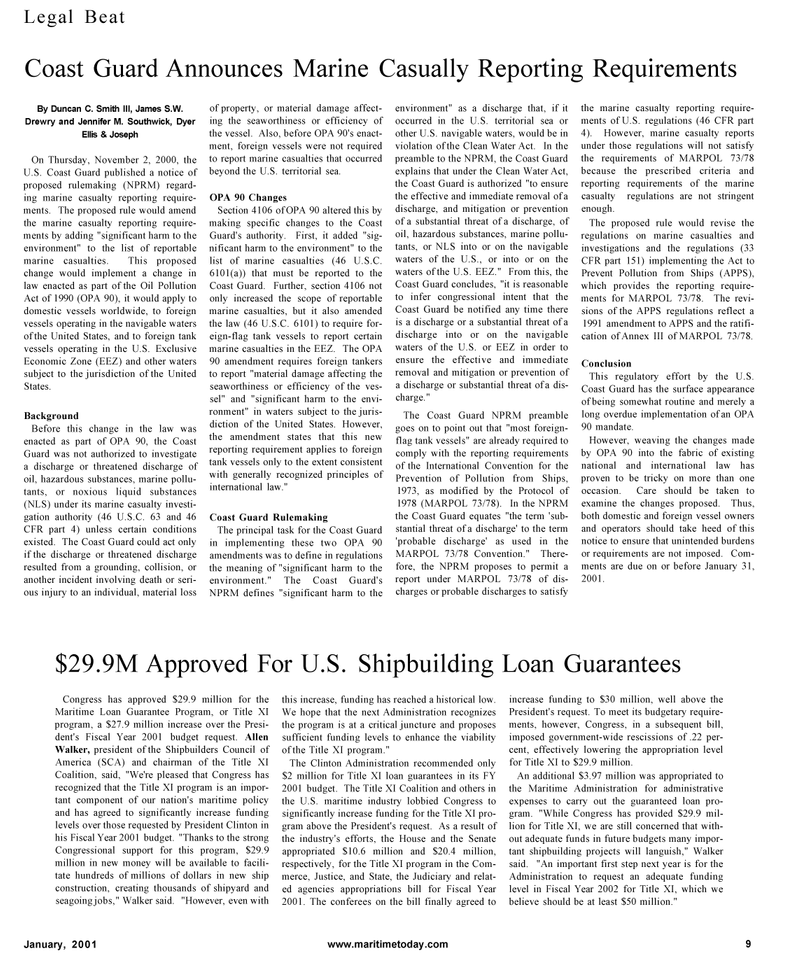
Page 9: of Maritime Reporter Magazine (January 2001)
Read this page in Pdf, Flash or Html5 edition of January 2001 Maritime Reporter Magazine
Legal Beat
Coast Guard Announces Marine Casually Reporting Requirements
By Duncan C. Smith III, James S.W.
Drewry and Jennifer M. Southwick, Dyer
Ellis & Joseph
On Thursday, November 2, 2000, the
U.S. Coast Guard published a notice of proposed rulemaking (NPRM) regard- ing marine casualty reporting require- ments. The proposed rule would amend the marine casualty reporting require- ments by adding "significant harm to the environment" to the list of reportable marine casualties. This proposed change would implement a change in law enacted as part of the Oil Pollution
Act of 1990 (OPA 90), it would apply to domestic vessels worldwide, to foreign vessels operating in the navigable waters of the United States, and to foreign tank vessels operating in the U.S. Exclusive
Economic Zone (EEZ) and other waters subject to the jurisdiction of the United
States.
Background
Before this change in the law was enacted as part of OPA 90, the Coast
Guard was not authorized to investigate a discharge or threatened discharge of oil, hazardous substances, marine pollu- tants, or noxious liquid substances (NLS) under its marine casualty investi- gation authority (46 U.S.C. 63 and 46
CFR part 4) unless certain conditions existed. The Coast Guard could act only if the discharge or threatened discharge resulted from a grounding, collision, or another incident involving death or seri- ous injury to an individual, material loss of property, or material damage affect- ing the seaworthiness or efficiency of the vessel. Also, before OPA 90's enact- ment, foreign vessels were not required to report marine casualties that occurred beyond the U.S. territorial sea.
OPA 90 Changes
Section 4106 of OPA 90 altered this by making specific changes to the Coast
Guard's authority. First, it added "sig- nificant harm to the environment" to the list of marine casualties (46 U.S.C. 6101(a)) that must be reported to the
Coast Guard. Further, section 4106 not only increased the scope of reportable marine casualties, but it also amended the law (46 U.S.C. 6101) to require for- eign-flag tank vessels to report certain marine casualties in the EEZ. The OPA 90 amendment requires foreign tankers to report "material damage affecting the seaworthiness or efficiency of the ves- sel" and "significant harm to the envi- ronment" in waters subject to the juris- diction of the United States. However, the amendment states that this new reporting requirement applies to foreign tank vessels only to the extent consistent with generally recognized principles of international law."
Coast Guard Rulemaking
The principal task for the Coast Guard in implementing these two OPA 90 amendments was to define in regulations the meaning of "significant harm to the environment." The Coast Guard's
NPRM defines "significant harm to the environment" as a discharge that, if it occurred in the U.S. territorial sea or other U.S. navigable waters, would be in violation of the Clean Water Act. In the preamble to the NPRM, the Coast Guard explains that under the Clean Water Act, the Coast Guard is authorized "to ensure the effective and immediate removal of a discharge, and mitigation or prevention of a substantial threat of a discharge, of oil, hazardous substances, marine pollu- tants, or NLS into or on the navigable waters of the U.S., or into or on the waters of the U.S. EEZ." From this, the
Coast Guard concludes, "it is reasonable to infer congressional intent that the
Coast Guard be notified any time there is a discharge or a substantial threat of a discharge into or on the navigable waters of the U.S. or EEZ in order to ensure the effective and immediate removal and mitigation or prevention of a discharge or substantial threat of a dis- charge."
The Coast Guard NPRM preamble goes on to point out that "most foreign- flag tank vessels" are already required to comply with the reporting requirements of the International Convention for the
Prevention of Pollution from Ships, 1973, as modified by the Protocol of 1978 (MARPOL 73/78). In the NPRM the Coast Guard equates "the term 'sub- stantial threat of a discharge' to the term 'probable discharge' as used in the
MARPOL 73/78 Convention." There- fore, the NPRM proposes to permit a report under MARPOL 73/78 of dis- charges or probable discharges to satisfy the marine casualty reporting require- ments of U.S. regulations (46 CFR part 4). However, marine casualty reports under those regulations will not satisfy the requirements of MARPOL 73/78 because the prescribed criteria and reporting requirements of the marine casualty regulations are not stringent enough.
The proposed rule would revise the regulations on marine casualties and investigations and the regulations (33
CFR part 151) implementing the Act to
Prevent Pollution from Ships (APPS), which provides the reporting require- ments for MARPOL 73/78. The revi- sions of the APPS regulations reflect a 1991 amendment to APPS and the ratifi- cation of Annex III of MARPOL 73/78.
Conclusion
This regulatory effort by the U.S.
Coast Guard has the surface appearance of being somewhat routine and merely a long overdue implementation of an OPA 90 mandate.
However, weaving the changes made by OPA 90 into the fabric of existing national and international law has proven to be tricky on more than one occasion. Care should be taken to examine the changes proposed. Thus, both domestic and foreign vessel owners and operators should take heed of this notice to ensure that unintended burdens or requirements are not imposed. Com- ments are due on or before January 31, 2001. $29.9M Approved For U.S. Shipbuilding Loan Guarantees
Congress has approved $29.9 million for the
Maritime Loan Guarantee Program, or Title XI program, a $27.9 million increase over the Presi- dent's Fiscal Year 2001 budget request. Allen
Walker, president of the Shipbuilders Council of
America (SCA) and chairman of the Title XI
Coalition, said, "We're pleased that Congress has recognized that the Title XI program is an impor- tant component of our nation's maritime policy and has agreed to significantly increase funding levels over those requested by President Clinton in his Fiscal Year 2001 budget. "Thanks to the strong
Congressional support for this program, $29.9 million in new money will be available to facili- tate hundreds of millions of dollars in new ship construction, creating thousands of shipyard and seagoing jobs," Walker said. "However, even with this increase, funding has reached a historical low.
We hope that the next Administration recognizes the program is at a critical juncture and proposes sufficient funding levels to enhance the viability of the Title XI program."
The Clinton Administration recommended only $2 million for Title XI loan guarantees in its FY 2001 budget. The Title XI Coalition and others in the U.S. maritime industry lobbied Congress to significantly increase funding for the Title XI pro- gram above the President's request. As a result of the industry's efforts, the House and the Senate appropriated $10.6 million and $20.4 million, respectively, for the Title XI program in the Com- merce, Justice, and State, the Judiciary and relat- ed agencies appropriations bill for Fiscal Year 2001. The conferees on the bill finally agreed to increase funding to $30 million, well above the
President's request. To meet its budgetary require- ments, however, Congress, in a subsequent bill, imposed government-wide rescissions of .22 per- cent, effectively lowering the appropriation level for Title XI to $29.9 million.
An additional $3.97 million was appropriated to the Maritime Administration for administrative expenses to carry out the guaranteed loan pro- gram. "While Congress has provided $29.9 mil- lion for Title XI, we are still concerned that with- out adequate funds in future budgets many impor- tant shipbuilding projects will languish," Walker said. "An important first step next year is for the
Administration to request an adequate funding level in Fiscal Year 2002 for Title XI, which we believe should be at least $50 million."
January, 2001 www.maritimetoday.com 9

 8
8

 10
10
